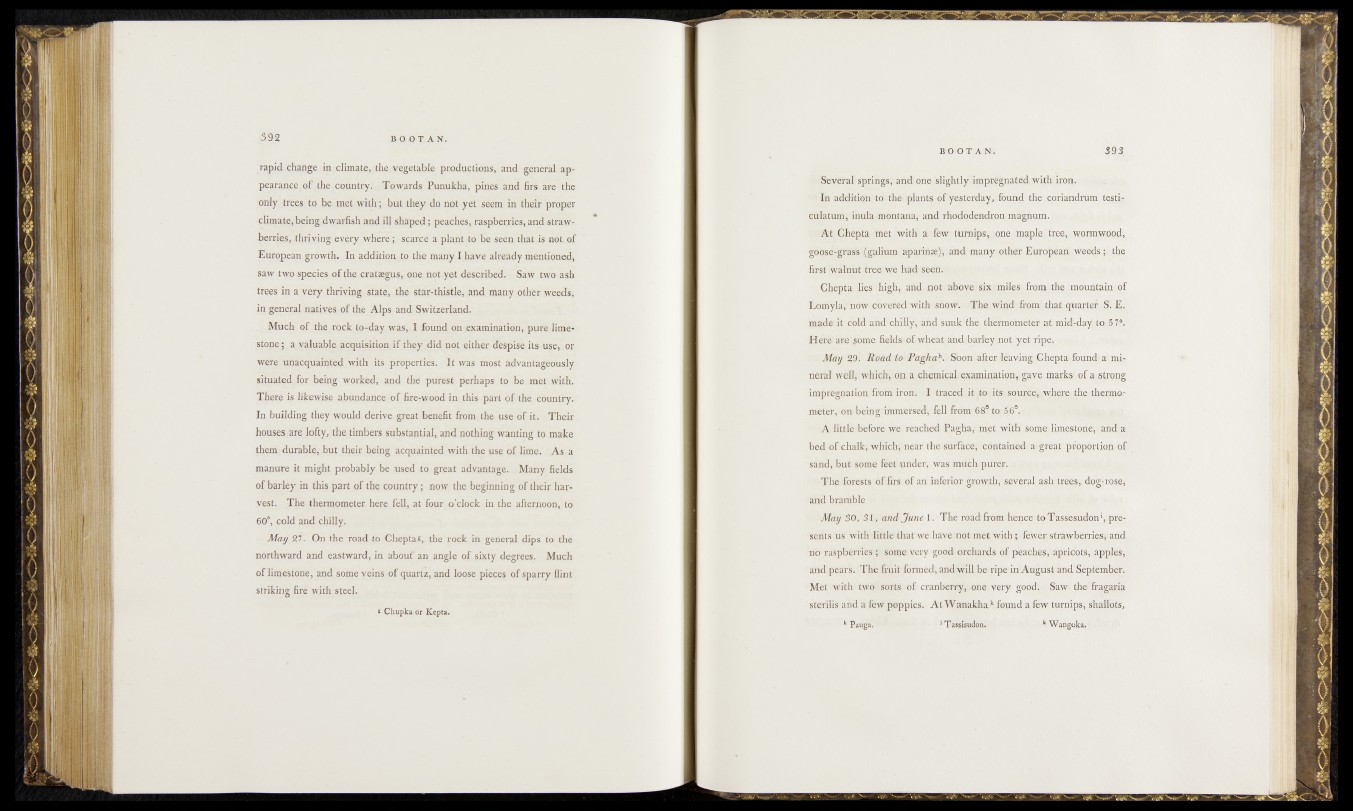
rapid change in climate,?.the i vegetable productions, and general ap-
pe^rancp^of .the' country. Towards Punukha, pines and firs are the
oidy treesj to be; mej. with!^ but they'do not yet seem in their proper
^i^^g^bglhgidwarfish and ill shaped; peaches, raspberries, and strawberries,,
thriving every where; scarce a plant to be seen that is not,of
European growth. In addition to the many I have already mentioned,
saw two speci^of the crataegus, one not yet described. SaW two ash
trees, in a very thriving state, the star-thistle, and many other weeds,
in general natives of the Alps and Switzerland.
Much of the rock to-day was, I found on examination, pure limestone
; a valuable acquisition if they did not either despise its use,.or
were unacquainted with its properties. It was most advantageously
situated,for: being worked, and the purest perhaps to be met with.
There is likewise abundance of fire-wood in this part of the country.
In building they would derive great benefit from the use of it. Their
houses-are lofty, the timbers substantial^ and nothing- wanting to make
them, durable, but their being acquainted with the use of lime. As a
manure it might probably be used to great advantage. Many fields
of barley in this part of the country; now the beginning of their harvest.
The thermometer here fell, at four o’clock in the afternoon, t o
60°, cold and chilly.
May 27. On the road to Chepta*, the rock in general dips to the
northward and eastward, in abouf an angle of sixty degrees. Much
of limestone, and some veins of quartz, and loose pieces of sparry flint
striking fire with steel.
s Chupka or Kepta.
< «Several springs,: and? qnte.slightlyiin*pjl|^atódi(with iron.
' In addition'to dae^ plants of yesterday, found ^ayriandnith teslfs;;
culatum, inula montana, and rhododendron magnum.
-At Êhepta met wTtliai’fewHumips^^é^g^ldÊÉiai wonmwdbd1,
goose-grass'-,(galium, aparin®)$|alnd! nrjnj&qftkfiii EuioppanLweeds » the
firs-t* iValnüï free we* had g
.Chepta lies highland not -’above ■ si$r.,mil^ ^fretn^-the ' mountain ..qff
'töifl-yia|f'pow ooVeïêik^ith snow. * The.'wind fr-oirn that.quarter. S. E.
made it cold and chilly,-and sunk fhèfcHónnomelcn'at micf-dayllcp^/^'
•Here: are ^ome fields ofwheat, and.-ba’riey,n,afc,,y efe-ripei .gw
May 559. Road to Pagha^.i Soon after, leaving ©^epta^foutidjia mineral
well; which,:-o'n a chemical, examination,igave in arks! of^a^trqpg
impregnation from ironi dhtrarced .it to its sonreej.wherqAfrtheffiifir
meter, on> being-immersed^ fell from 68°
'• A little before we reached P-agha^ niet» with some,limestone’,r-and.a
béd of chalk, which, near the surface, contained1 atgreat proportion of
sand, but seme feet under, was muehapurer. B s
-“:Tfae forests of firs of an. inferior grow4th, several ash tree?, dog-rose,
and bramble
M a y 30, 31, and June 1. The road from hence* to Tassesud'enVpre-
sents us with little that w ehavi'ftöl mefi W ^ l fewer,sfraw&#rii^at|d
frh' raSjiberrief 'p.Some very gooti-Orchards o f peaches,-apridbts, apples,
and pears. The fruit formed, andvwill be.-ripe in August and September.
Met with two- sorts of cranberry, öhe very gOodi-v-Saw’thefragaria
sterilis and a few poppies. A t Wanakhak found a few turnips-, shallots,
k Pauga. • 1 ■ '««.......- JT*ssK«don. * Wangoka.